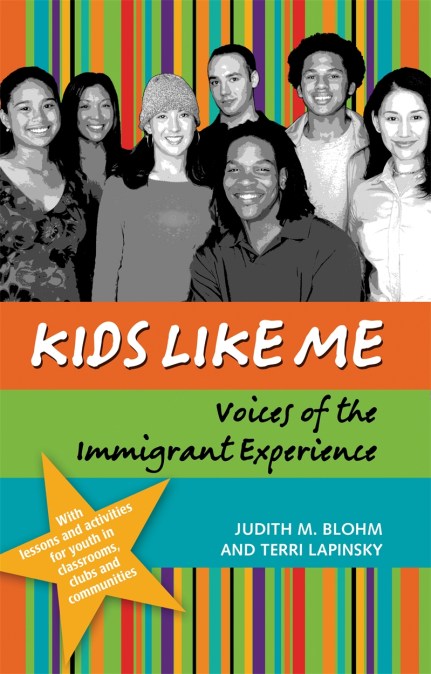As our neighborhoods grow more diverse, a splendid variety of cultures, values and traditions become an important part of our classrooms and schools. In Kids Like Me, 26 personal narratives celebrate the experience of young people making a new home in a strange community—finding common ground as they make new friends, learn English, share their cultural identities, their challenges, successes and dreams. Kids Like Me provides a youthful perspective on the important themes of crossing cultures, immigration and citizenship and learning to appreciate differences. These stories are intended to foster intercultural awareness and sensitivity and encourage individual and community action to assist newcomers in their adjustment. While written to help youth understand their classmates and friends, Kids Like Me also includes discussion questions, self-directed activities and research ideas for teachers and other mentors that can be used in classrooms, youth clubs and community settings. Richly illustrated with photos and maps of each home country, the text presents countless opportunities to explore and understand different cultures and new friends. Young people who have come from all over the world share their stories and invite their new neighbors to see that in so many ways these kids are just like me.
Newsletter Signup
By clicking ‘Sign Up,’ I acknowledge that I have read and agree to Hachette Book Group’s Privacy Policy and Terms of Use
Reviews
Kids Like Me: Voices of the Immigrant Experience provides a valuable resource for educators, volunteers, staff of youth organizations and parents of young people attending schools with the "kids" whose profiles are so sensitively shared. Globalization's young faces and voices come alive in Kids Like Me.
Kids Like Me: Voices of the Immigrant Experience is at once a delightful, timely, and very serious contribution to intercultural relations by two of the field’s most experienced practitioners. Judee Blohm and Terri Lapinsky offer a creative, compassionate, informative, and ultimately very practical treatment of a topic that is already huge in its implications and only continues to grow in significance. Teachers, students, and interculturalists alike will benefit from this fine book.
This book is about understanding from the heart, understanding how being "the other" feels, and helping people who have never experienced that "otherness" to feel what being different feels like – to feel the pain of being ostracized or being made to feel different, as well as the gratitude and wonderment of coming to a new place and being welcomed, accepted, and loved. Your book gives teachers meaningful and accessible ways to help them explore these complex themes with their students, to help them recognize the pain inflicted by racism as well as recognize opportunities for kindness, and valuing diversity.
